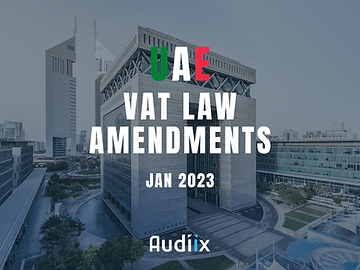On September 2022 the UAE has issued the Federal Decree-Law No. (18) of 2022 (“the Amendment of VAT Law”) to amend some provisions of the Federal Decree-Law No. 8 of 2017 on Value Added Tax.
The amendments take effect from 1 January 2023.
This article highlights the key changes introduced in the amended United Arab Emirates VAT law, and outlines some potential implications on UAE businesses.
The key changes are summarized below:
Statute of Limitations
A new article (Article 79 bis) was added to the VAT Law.
According to this article, the FTA may not conduct a Tax Audit or issue a Tax Assessment after 5 years from the end of the relevant Tax Period. However, the standard period of 5 years can be extended in the following situations:
- There is a notification prior the expiry of 5 years
- The audit is related to Voluntary Disclosure made in the 5th year
- The audit involves a tax evasion situation (the FTA may conduct a Tax Audit or Assessment within 15 years)
- In cases of non-tax registrations (the FTA may conduct a Tax Audit or Assessment within 15 years)
These amendments are consistent with the Federal Tax Procedures Law. Accordingly, it may apply not only to VAT but also other taxes (namely Corporate Tax and Excise Tax). However, the article also mentions that extension of periods can further be amended by virtue of a Cabinet Decision.
Voluntary Disclosure limitation
It is worth noting that a Voluntary Disclosures cannot be filed after 5 years from the end of the relevant tax period.
Potentially, UAE businesses may consider strengthening their tax policy with respect to records keeping. Additionally, as a compliance strategy, it would be a good practice to conduct a mock tax audit at least each four years to reserve the legal right of voluntarily correcting any erroneous tax reporting or treatment.
Agent/Principal Place of residency
Place of Residence of the principal shall be considered as being the Place of Residence of the agent if the agent maintain stocks or enter into agreement on behalf of the principal.
This could have a significant impact on UAE businesses having agency arrangements. for instance, if the agent is in a foreign jurisdiction, the place of residence of the principal business would be that foreign jurisdiction not the UAE. This has to be carefully taken into consideration in order to identify the correct VAT treatment and implications.
On the opposite scenario, foreign businesses may be considered as resident in the UAE if their UAE based agents fulfills the conditions stipulated above.
Zero rated rules on import of certain goods and services
The new amendment included importation in addition to the supply of the category of zero-rated supplies. This includes:
- The import of means of transportation, and related goods and services
- The import of rescue aircraft or vessels,
- The import of crude oil and natural gas
- The import of related basic healthcare Goods
- The import of investment precious metals (if imported for investment purposes)
Importers of such goods must report these supplies as zero-rated in their tax return and must fully comply with invoices and imports documentation requirements.
Output Tax Adjustments
A taxable person shall adjust output tax after the date of supply not only if the tax was charged in error but also if the application of the tax treatment was incorrect (e.g., where it was treated as exempt/zero rated instead of taxable at 5%)
Tax Credit Note – Mechanism for Output Tax Adjustment
If the VAT charged exceeds the amount that should have been charged, a tax credit note must be issued within 14 days from the date on which any of the following cases occur:
- The consideration (payment) is changed
- The supply was canceled
- The VAT treatment has changed due to a change in the nature of the supply
- The customer returned the goods or services and the supplier refunded the payment
- The application of tax treatment was incorrect, for example applying a zero rate instead of 5%. (newly added amendment)
Businesses must ensure that they have the appropriate processes and systems to identify the need to issue a tax credit notes in a timely manner within 14 days.
Date of Issuance of Tax Invoice for continuous supplies
Tax invoice should be issued within 14 days from the date of supply including continuous supplies or consecutive invoices.
Businesses making periodic or continuous supply of goods or services that is invoiced on a monthly basis, for example, should review their systems and contracts to issue a tax invoice within 14 days from the date of supply (which explained below).
Special Date of Supply
In determining the date of supply for contract with periodic or consecutive payments or invoices a new date is added which is the date of expiration of one year from the date the Goods or Services were provided.
Now after this amendment, the date of supply of periodic payments is the earlier of:
- The date of the issue of the tax invoice;
- The date payment is due, as shown on the tax invoice;
- The date payment is received; and
- One year from when the goods or services were provided (newly added amendment)
Place of Supply of Goods for continuous supply
The place of supply of import/export of goods that involve continuous supply will be in the UAE, if the transfer of ownership happens in the UAE.
Place of Supply in Special Cases (transport-related services)
The place of supply of transport-related services is where the transportation starts (even if provided separately from transportation services e.g. by different suppliers).
Deemed Supply for Related Parties
Where a deemed supply occurs between related parties, the value of supply would be determined by the market value (not at cost) if:
- The supply i for free or below market value
- The recipient of the supply does not have the right to recover the full input VAT (for example, if he is not registered or he will use the deemed supply to make exempt supplies)
Deemed supply applies to goods or services that are bought for business purposes but are used privately, as gift, or commercial samples.
Recovery of Input Tax (Imports)
Input VAT on imports of goods & services can only be recovered upon receipt of invoice (and customs documents in case of goods).
Obligation to pay VAT
A taxable person is required to pay VAT if they issue a tax invoice with VAT or receives a VAT amount.
Supply of goods
The supply of goods is also an entry into a contract between more than two parties entailing the transfer of Goods at a later time.
Other out-of-scope transactions
A new clause that allows the Executive Regulations to stipulate any other transactions that should be considered outside the scope of UAE VAT.
Registration Exceptions
Registered taxable persons can apply for registration exceptions (as a result of making only zero-rated supplies), unlike in the previous version of VAT Law, where taxable persons could only apply for such exceptions at the time of registration
Cases of Tax Deregistration
The FTA has the right to deregister any registered person shall it assume such registration may cause any harm to the tax system.
Applicability of domestic reverse charge
Article 48 of the Decree Law now refers to “Pure Hydrocarbons” as a qualifying factor applying reverse charge under domestic RC mechanism. Furthermore, the term “Pure Hydrocarbons” is also defined as “Any kind of different pure combinations of a chemical equation made only of hydrogen and carbon (CXHY).”
Consequently, the domestic reverse charge provisions will apply to “Pure Hydrocarbons” that fall within the new definition as opposed to “Hydrocarbons” of any kind.
Definitions under Article 1 of the Amended Decree Law
Certain terms are defined for the first time under the Amended VAT Law, these include:
- Relevant charitable activity
- Tax evasion
- Tax audit
- Tax assessment
- Voluntary Disclosure
- Tax Procedures Law
How can Audiix help?
Audiix will work with you to apply all the amendments applicable to your business starting 01 January 2023. if you have any question please feel free to email us using your dedicated Audiix email or at tax@audiix.com.


